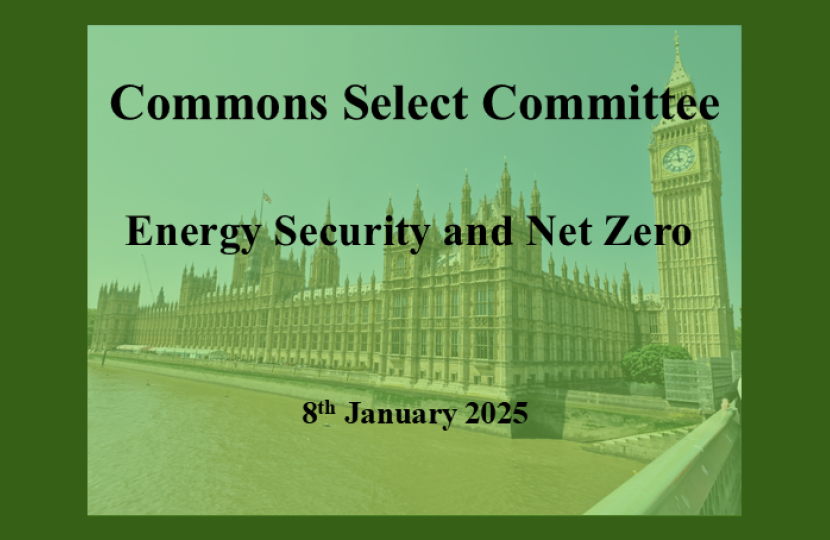
Chris Inquires Regarding Climate Change Adaptation & Resilience Measures
Chair: We will explore all of those in some detail. Chris Chope has a follow-up question.
Q260 Sir Christopher Chope: Thank you for highlighting the importance of adaptation and resilience, which are among your statutory responsibilities. When it comes to public investment to meet those objectives, how do you evaluate the relative benefits of taxpayer-funded investment in adaptation and resilience measures compared with taxpayer investment in going for net zero emissions?
Emma Pinchbeck: Can I check that I’m understanding right? Is the question about whether, if we focused all our resources on making the economy resilient, we would have to spend less money on investing to mitigate climate change up front by switching to newer technologies? Are you looking for—
Q261 Sir Christopher Chope: Let me give a specific example. The Environment Agency published a report at the end of December saying that as a result of climate change, one in eight properties in England is going to be in danger of being flooded by the middle of this century. The cost of dealing with that, preventing it and adapting to meet that threat is going to be enormous. There is no evidence from anything I have seen in your report so far to suggest that you are putting sufficient pressure on the Government, given the financial issues around public expenditure coming up next year, to respond to that crying need. You only have to look at the television over the last few days to see that, for most people, the threat of flooding is far more realistic than the threat that we are not going to meet net zero by 2050, which, to a large extent, is not going to make a ha’p’orth of difference to whether or not their house gets flooded.
What are you doing about that issue, bearing in mind that your own progress report in 2023 highlighted it? You then did a follow-up programme last year, in which you commented on the failure of the Government to deal with the national adaptation programme. In that commentary, you highlighted good practice. You referred to the United States investing some $6 billion in making communities more resilient to the impact of climate change. You highlighted the Canadian adaptation strategy, which has specific aims and objectives and how they are going to be met. You highlighted the Delta programme in Holland, which has investment of €27 billion, so that by 2050 they will be able to deal with threats of flooding on the basis of a one in 100,000 year risk. In my constituency, we cannot even get sufficient investment to cover the one in 100 year risks.
You highlighted those manifest failures in your report early last year, and now you are talking about another report come October. Why aren’t you doing something to ensure that what you have already put on paper is delivered as a priority? Why don’t you say that this is even more important than investing taxpayer subsidies in windmills?
Emma Pinchbeck: On the last point, I think we would say that you definitely need to do both. On adaptation, I am really grateful for the question, because you are absolutely right: it has not been given enough attention historically in Government. We have said that on the record. I used my first interview to say it again. I highlighted it in my opening remarks as something I would like to see achieved.
There are a few reasons, in terms of the Climate Change Act, why the adaptation committee gets less profile, one of which is that it is a sub-committee in the Act and the main committee is the mitigation committee. That tells you that in 2008 adaptation was less present for people, but we are feeling the impacts now.
We are required by the Climate Change Act to offer the adaptation reporting that we do, and to comment on Government progress, but we are an independent statutory body. We are not the Government. It would be inappropriate for us to be able to have teeth to make the Government do anything. For what it is worth, I would very much like to meet the Secretary of State for EFRA. I have had an invitation to see him, and I have met the ESNZ Secretary of State already. I am waiting to see the Secretary of State for EFRA. Hopefully, they hear this evidence, and I get that invitation. We will be doing what we can publicly to hold them to account for delivery, including on a progress report.
More broadly, we would like a more comprehensive framework for adaptation. This is a bit technical, but you can measure mitigation pretty effectively. There are clearly agreed principles for that internationally, and domestically, and how you track it. It is less clear on adaptation. You mentioned the examples I have given before about what other countries do. There is some real learning from the 25 other climate committees internationally, where adaptation has been a bigger part of their remit, and they have done more thinking on it. We have said to Government that the priority for them is to get in place a framework for measurement, because if we have that, we can more effectively hold them to account.
The last thing—this is a chief executive’s point—is that we are not as well resourced to do the work on adaptation as we are on mitigation. We are physically not as well resourced by Government to do the work that we do on adaptation compared with mitigation.
Q262 Sir Christopher Chope: Why is that?
Emma Pinchbeck: That is a question for Government. I imagine it is because of the relative weighting that they have previously put on the work of adaptation and the work on mitigation, but I would very much welcome that conversation.
Q263 Sir Christopher Chope: Could you let us have a note on that, because I had not realised that that was one of the excuses for not delivering on your goals under the 2008 Act?
Emma Pinchbeck: I would be very happy to give you some of that background, of course. I will follow up.
Q264 Sir Christopher Chope: In the meantime, we don’t have to wait until October, do we, for you to get the Government to respond to the concerns that you have articulately expressed here?
Emma Pinchbeck: I should hope, with the impacts we are seeing in the economy, that the Government are going to move to make this a priority. I should say that, before Christmas, in responding to our progress report, which had an adaptation recommendation in it, the Government said that they are really keen to bring together better governance on adaptation across Government and that they are going to use the Cabinet Office and bring together Treasury, DEFRA, No. 10 and other relevant Departments to look at adaptation across the economy, because it affects the entire economy.
The other thing we would say they should do is look at bodies like the National Infrastructure Commission that offer advice on things like critical infrastructure, and bring those together too. We are very up for doing more work on adaptation. I hope it is clear that I am going to do all I can to hold Government to account on it. It will be a big theme over the next 10 years because of the impacts we are experiencing. I can follow up with a note on what more we would need to do.
Chair: Thank you very much. We are going to move to another topic. Adaptation goes a little beyond the remit of this Committee. Our main task is to hold the Department for Energy Security and Net Zero to account, and that is one of the challenges, of course. You have highlighted the multi-departmental agendas that you are commenting on and working to, and I wish you well in getting your meeting with the Secretary of State for Environment, Food and Rural Affairs.
Q265 Sir Christopher Chope: On a matter of fact, I thought that DESNZ was the Department that had responsibility for the Climate Change Committee. If it is the Department to which the Climate Change Committee reports, and DESNZ is basically their sponsor Department, surely we as a Committee, which is responding to that and holding that Department to account, should be able to say that we need to have more priority given to adaptation.
Emma Pinchbeck: I am very happy to follow up with a technical note, but our funding for adaptation comes through DEFRA, and DEFRA is currently the Department responsible across Government for most of the adaptation work. There is clearly a bit of blurring of the lines, in that DESNZ is our main sponsoring Department. I am conscious of time, so I will follow up on that.
Chair: That would be very helpful.
Q266 Luke Murphy: Could you confirm that failure to mitigate and tackle climate change will result in much higher costs and impact around adaptation, and that that is what the evidence suggests? The costs of adaptation, flooding and impacts, will be much higher if we fail to mitigate. Is that what the evidence shows?
Emma Pinchbeck: Yes, of course. The point of the carbon budgets is that they are in line with an international 1.5° target, designed to avoid the worst impacts internationally of climate change, which include impacts here. I think the point entirely is that we have to do both, not either/or. What I mean to say is that the impacts of climate change are very visibly here in the economy. For the public, there is more discussion about adaptation happening. It is absolutely right that it needs as much profile as the mitigation work we do, but it is definitely both, and without mitigation work those impacts will be worse, including for citizens in the UK.
-ENDS-


